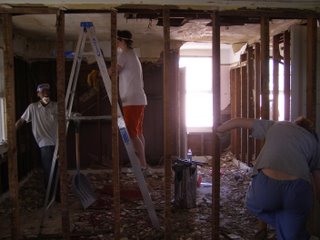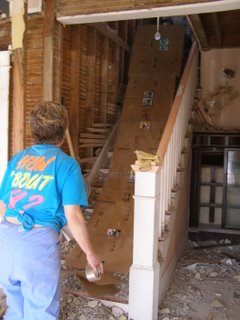Hurricane Relief: Day 1

On Ash Wednesday, I drove to the New Orleans area with a group of about 25 Centenary students and staff. Over the next four days, we gutted as much of a house as we could, emptied the Boys and Girls Club of Slidell, toured the Ninth Ward, and drove home wanting to go back. Here are my notes from the work on Day 1:
Finally over Lake Pontchartrain we saw our first inundations of hurricane damage. Though Katrina hit August 29 (now 6 months ago) blue tarps still rest on so many roofs, tent villages rest off the interstate, trailers enjoy stairs and landscaping in the front yards of pier-and-beam homes, smashed windows appear as design elements down skyscraper sides. Water lines remain like mold tattoos on houses street after street.
Hardly any stores open, we drive past boarded-up Rite-Aids while several tell stories of driving through New Orleans not long after the storm to see $6000 signing bonuses on McDonald's marquees. Omnipresent vans and trucks bring help while other cars just bring normal people back to an attempt at normal lives in the city.
We finally arrive at our job in east New Orleans: the pink house has a lovely front porch, red double French doors for the entry and a set of French doors on either side into other rooms. Betsy went through the house to get instruction about what work to do: the walls marked X were to be torn down. Those who had been on the fall trip went immediately to work—no further instruction necessary. The banging was cacophonous and piercing. The rest of us, however, required some guidance: for real, I'm just supposed to hit this wall? for real, I'm supposed to rip all this out? Sure enough, yes was almost always the answer. How peculiar. I began in the kitchen and immediately began imagining what it would be like to have this done to my kitchen, my living room, my bedroom, my dining room. Nothing in the house looked hers any longer—just wallpaper and paint, no personal belongings (which had all been moved to the back house or to storage). Suddenly her space is full of strangers. Helpful strangers, but the help is demolition.
How peculiar. I began in the kitchen and immediately began imagining what it would be like to have this done to my kitchen, my living room, my bedroom, my dining room. Nothing in the house looked hers any longer—just wallpaper and paint, no personal belongings (which had all been moved to the back house or to storage). Suddenly her space is full of strangers. Helpful strangers, but the help is demolition.
What would it be to have 20 strangers enter my home and start ripping down mildewed walls? Our wedding china would likely have been shattered, our clothes black with mold, our books warped beyond readability, and on and on. But the owner must have spent enough fright and anxiety and sadness over it already because she simply came alongside and worked with us. We ripped down the wooden planks behind plaster behind drywall in almost every room, down to the bare frame. Then scooped up the chunks in shovels and created a mound 4' high by 15' long as new hedgery between her house and street. The second floor demolition created a huge disposal problem: how to move that trash to the street? Through the window? but it dispersed too far (if flung down by shovel) or came down in too heavy of chunks (like trash bags).
We ripped down the wooden planks behind plaster behind drywall in almost every room, down to the bare frame. Then scooped up the chunks in shovels and created a mound 4' high by 15' long as new hedgery between her house and street. The second floor demolition created a huge disposal problem: how to move that trash to the street? Through the window? but it dispersed too far (if flung down by shovel) or came down in too heavy of chunks (like trash bags).
The best method seemed down the stairs, which created a steady slide of plaster, wood, and general debris. The women sequestered upstairs shoveled their trash to the top of the stairs, someone else pulled it to the mid-floor landing, and a pair of others pushed it down to the ground level where two other people bagged it. Each person had his or her own technique: Eric (strong and a thinker) pulled with the rake and pushed with his feet (riding it down like a snow drift), Helen kicked it backwards as though she were on a treadmill, I pushed and pulled with my feet using my quads and leaned over to fill shovels with my hands. Then we scooped shovelful after shovelful into trash bags and trash bins, all to land on the curb.

No comments:
Post a Comment